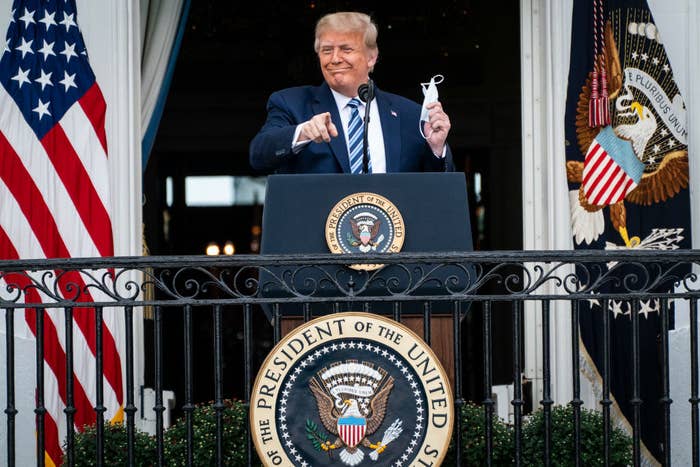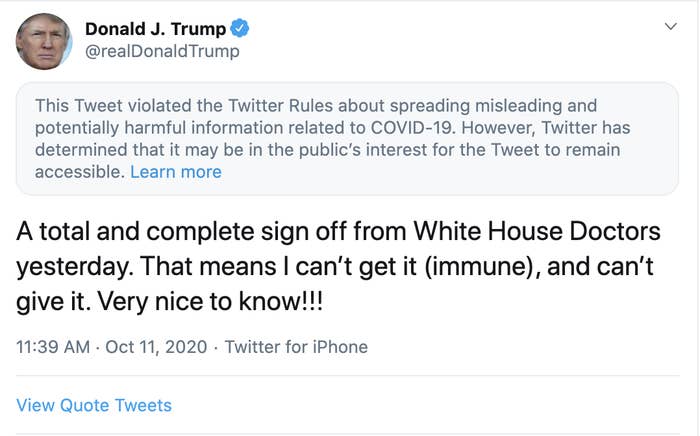
President Donald Trump's tweet that he is immune to COVID-19 and can no longer get infected or transmit the virus was flagged by Twitter as "misleading" and "potentially harmful" on Sunday.
Trump tweeted Sunday morning that he had gotten "a total and complete sign off from White House Doctors yesterday."
"That means I can’t get it (immune), and can’t give it. Very nice to know!!!" Trump tweeted.

Hours later, Twitter put a warning on the tweet saying that it "violated Twitter Rules about spreading misleading and potentially harmful information related to COVID-19."
Twitter added that it "may be in the public’s interest for the tweet to remain accessible." Users cannot retweet or favorite the tweet, but are allowed to quote-tweet it.
Trump also told Fox Business on Sunday morning that he was immune to COVID-19.
"It looks like I'm immune for, I don't know, maybe a long time, maybe a short time," Trump told Fox Business. "It could be a lifetime. Nobody really knows, but I'm immune."
The CDC has said there is limited information about getting reinfected with COVID, though there have been a handful of reported cases of reinfection. Scientists are still not sure how long immunity to the coronavirus lasts.
In a memo on Saturday night, Trump's physician, Dr. Sean Conley, cleared the president for a return to an active schedule, saying that he "is no longer considered a transmission risk to others."
In the statement, Conley said that Trump was 10 days from the onset of COVID-19 symptoms and that he has been fever-free for "well over 24 hours," claiming that meant Trump had met the CDC's criteria to end isolation.
The CDC says that isolation for most people with COVID-19 can be discontinued 10 days after symptom onset and "resolution of fever for at least 24 hours, without the use of fever-reducing medications, and with improvement of other symptoms."
People with more severe cases of COVID-19 may need to self-isolate for up to 20 days. Trump was given one COVID-19 treatment, the steroid dexamethasone, recommended only for people with serious illness, raising questions about the severity of his disease.
But in his memo, Conley did not say whether the president was on fever-reducing or other medications. And Conley has repeatedly refused to reveal when the president last tested negative for COVID-19 since his positive diagnosis.
The CDC has said that people can continue to test positive for up to three months after COVID-19 diagnosis and not be infectious to others.
However, the CDC noted in August that "this science does not imply a person is immune to reinfection with SARS-CoV-2, the virus that causes COVID-19, in the 3 months following infection."
The CDC has said that there are no confirmed reports of a person being reinfected with COVID-19 within three months of initial infection, but added that the research was ongoing.
"If a person who has recovered from COVID-19 has new symptoms of COVID-19, the person may need an evaluation for reinfection, especially if the person has had close contact with someone infected with COVID-19," the CDC said.
Conley's medical briefings and memos about the president's condition, his treatment, and medications have been consistently confusing and evasive.
His memo was released hours after Trump — standing on a White House balcony — addressed hundreds of supporters gathered on the South Lawn of the White House in a campaign-style rally.
"I'm feeling great," the president told the crowd, in his first significant public appearance since he was discharged from the Walter Reed Medical Center after spending only three days there.
White House officials had said the president would speak for 30 minutes, but Trump spoke for an unusually short 18 minutes at the event, the New York Times reported.
